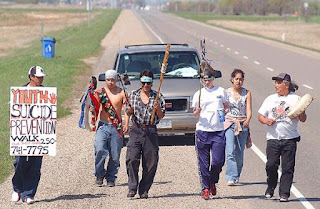What Actions can be Taken?

The most important thing we can do is become aware of the issues that indigenous Canadians face, such as their struggle with mental illness and addiction. If Canadians were able to first show that they understand the discrimination faced by First Nations, it would be a huge step rathering than keeping the issue hidden where nobody will be willing to admit it. We are encouraged to build healthy communities and relationships with our First Nations neighbours, get involved in aboriginal community events, and ensure that they are equally included in the broader community conversations and events. We have the ability to reverse some of the extreme discrimination and marginalization that these people have been faced with, simply by including them and getting rid of the mentality we are any different. We must recognize that we are all human and it is our duty to help each other, especially as the indigenous community is such an important part of Canada. Buying aboriginal is a good way t...





